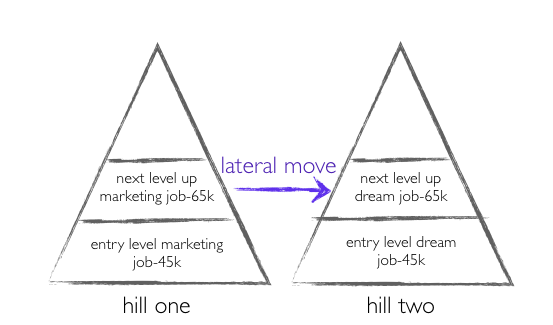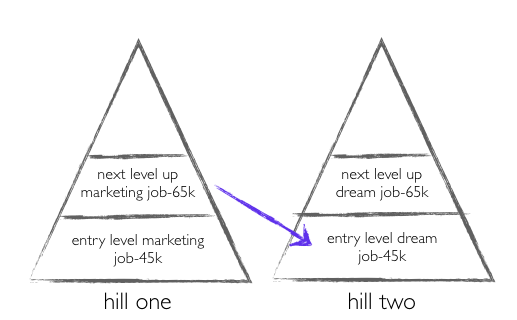I had coffee today with a friend who is also a teacher. She teaches at one of the most elite private schools where her students are smart, privileged, and most certainly, under a lot of pressure (both from their parents and the kind that is self-imposed). After they leave school, they move onto college, and after college, they start their job hunt. It’s a “traditional” path for those of us who are lucky enough to take it, and my teacher friend tends to stay in touch with her former students throughout the journey.
She pointed out a new trend she was noticing in many of her former students who are now beginning their job searches – that the same parents who put pressure on them throughout high school and college to achieve, achieve, achieve, are now encouraging them to take their time in their job search, and not to take “any job” but “the right job”…and indeed, they are taking their sweet time, turning away offers, living in the basement. Certainly the thought process behind that is a good one (do only what you are passionate about)… so why was she so annoyed by it?
In terms of picking a career path, it does seem like there is a really fine line between being thoughtful & selective vs. being entitled. A few years back, I stumbled upon a really interesting article written by Chris Dixon called “Climbing the wrong hill” (definitely recommend reading). It describes the notion of people instinctively taking steps in an upward direction. The default is to always climb higher, despite knowing (perhaps deep down) that what they really want, is not at the top of “the hill” but at the top of a different hill, somewhere in the distance.
A common mistake I see a lot of young people make is taking a job just to take it… perhaps it is at a cer tain company “to get their foot in the door” or perhaps it is because it pays well, or “looks good” on a resume. What they don’t realize is that in an incredibly competitive job market it is very very difficult to make a “lateral move” a few years in. Note: A lateral move is taking a job at the same level with the same pay in a different function. It can be within the same company or a different (but similar company). With the hill example it would look like the below:
Seems ideal, right? Yes, it would be great to be able to choose any career path, make money, get your feet wet, and assume the skills you gain will be transferable when that dream job opens up. The reality is that in this type of job market, companies are going to have their choice of many many applicants to fill that dream job. And would that company rather pay that 65k to someone who has been living and breathing in that world for the past 3 years or someone who has been doing something completely different? It seems that in a tough job market those “transferable” skills come standard, and the icing on the cake is the the previous, relevant, experience. So in many cases, when one decides to pursue their dream job, they aren’t necessarily going to get that lateral move they are looking for and it is more likely to look like the below…
Instead of a lateral move, it will more likely be a “step back” leaving you at the base of a brand new hill. Trust me, my point in saying all that is not to say, don’t follow your dreams and stay on your current path. That is the opposite of the advice I would give.
My advice is wholeheartedly to go for that dream job. Go for it the minute you realize that it is your passion. Go for it as soon as possible given your circumstances. And to Chris’s point, don’t spend any more time than you have to climbing the wrong hill. If you know your current path is not the one you want to stay on, you are fooling yourself if you think it will do you any real favors in the future.
All that being said, an even better scenario is not getting on that path to begin with which brings me back to my conversation in the coffee shop. Parents (who are fortunate enough to do so – I fully realize this is the exception and not the norm) are in some cases encouraging their kids to really choose a career they are passionate about, and to take their time if necessary. They may choose to support them financially or otherwise during this time. This type of support gives the job-seeker a a chance to really consider their options, different types of work, company cultures, career paths. It is a gift to them to help them get on “the right hill” from day one.
And even if you aren’t part of this tiny percentage she described to me, and don’t have your parents bankrolling you, there is nothing wrong with taking a bartending, babysitting, etc. job to make some money and stay afloat while you are looking. As you do that, take on classes, steps, and projects, to make yourself a stronger candidate for the role you really want, and know you will love.
As “millennials” (a term I am quite sick of) we hear a lot of people define our generation in a bitter tone – and “entitled” is one descriptor I hear often. As my friend described one of her former students turning down “a perfectly good job” this is probably a word that came to mind. Because there is a thin line between being entitled and being careful and selective. To me, being entitled is feeling that you deserve the best job with the best pay without being willing to put in the time. Being selective means being patient and not accepting the first job handed to you out of desperation and taking every imaginable step to go after what you love. We all have different circumstances which come into play with decisions like this, but being honest with yourself about what you are really passionate about, and taking the time to go for it, is a small investment to make up front. In turn, it can provide you with a meaningful career that will be worth the short wait, that you can get started on right away… and help you spend the next few years climbing up the right hill.







